Democrats in 1900 made the NC Constitution racist: Will voters today undo that?
In 1900, white supremacist Democratic voters amended the North Carolina Constitution with a Literacy Clause to stop Black people from voting, and a bipartisan effort to repeal the now-unenforceable clause could be presented to 21st-century voters in November 2024.
But will North Carolinians vote to remove this racist policy from the state’s foundational document?
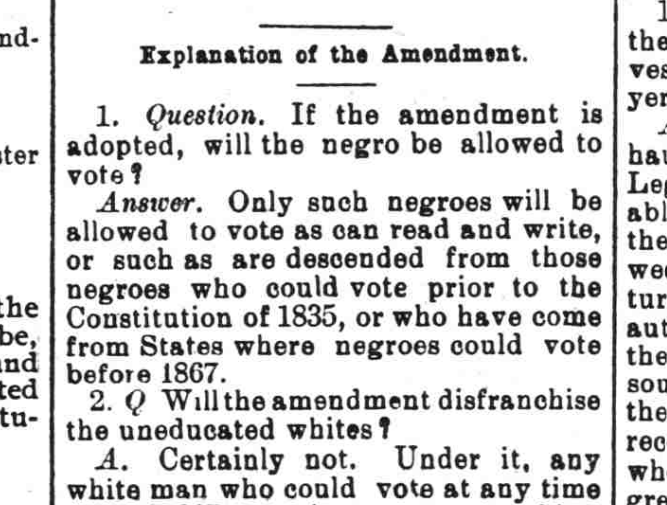
Recent polling has been mixed. And in 1970, North Carolinians voted 56% to 44% to keep the Literacy Clause even though by then it had been squelched by the Voting Rights Act of 1965.
Here are five things to know about the issue:
1. What is the Literacy Clause, and how did it stop Black people from voting?
The Literacy Clause is Article VI, Section 4 of the North Carolina Constitution. It says one of the qualifications to register to vote in North Carolina is literacy.
“Every person presenting himself for registration shall be able to read and write any section of the Constitution in the English language,“ it says. It was enacted when many Americans, including 44% of Black people, were illiterate, according to the National Center for Education Statistics.
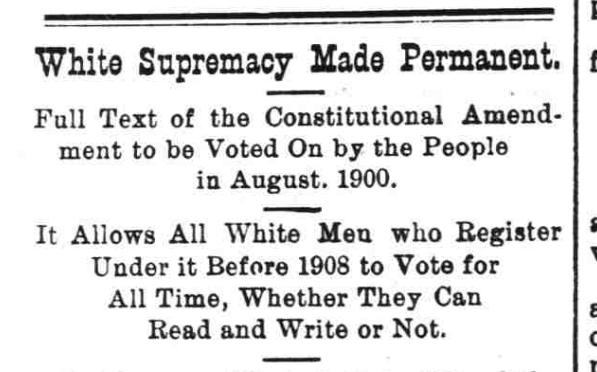
On its face, the Literacy Clause did not appear to target Black men (at the time, no women were allowed to vote regardless of their race), but the constitutional amendment of 1900 had much more to it. It had language known as a “grandfather clause” that created a loophole to allow illiterate white men to vote while preventing illiterate Black men from registering to vote.
The white supremacists seeking support for the literacy test amendment and the grandfather clause explained their goals plainly in The Fayetteville Observer in April 1899.
“White Supremacy Made Permanent” says a headline on an article that announced the Literacy Clause amendment to N.C. Constitution would be on the ballot in August 1900. The article included a Q&A about what the amendment would do and how it would allow illiterate white voters to cast ballots but prevent Black citizens from registering to vote.
“Q. Will the amendment disfranchise the uneducated whites?” the article said.
“A. Certainly not,“ it said. “Under it, any white man who could vote at any time before 1867, or whose ancestors (that is, his father, grandfather, great-grandfather, etc.) could vote at any time before 1867, can register — whether he can read and write or not — any time before 1908, and will always thereafter be entitled to vote. This lets in every white man and Croatan, however lacking in education, who has not been convicted of an infamous crime.”
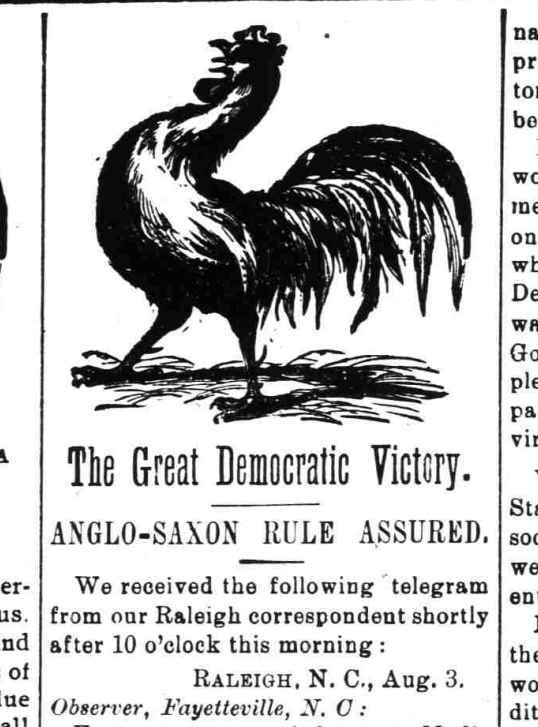
Following the elections of August 1900, The Fayetteville Observer published articles celebrating that white supremacist Democrats won handily in Cumberland County and statewide. They reported that Democrats pushed out Republican and Populist party candidates (whose Fusionist coalition had knocked the Democrats out of power six years prior) and that the literacy test amendment was approved.
“The Great Democratic Victory. Anglo-Saxon Rule Assured,” said a headline on Aug. 3, 1900.
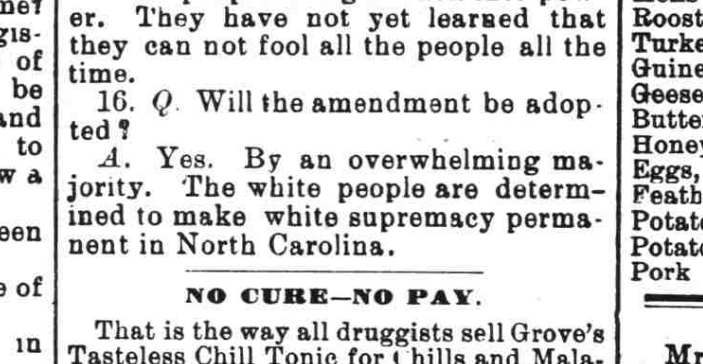
2. Did the Literacy Clause stop literate Black citizens from voting? Yes
Although the literacy tests allegedly were intended only to stop illiterate people from voting, they were used to stop educated people, too.
In 1956, Henry Frye was a Black college graduate who tried to register to vote along with his fiancee. The voting registrar did not ask the couple if they can read or write, he told Spectrum News in 2021. Instead, the registrar asked them to recite facts about the U.S. Constitution and to name people who had signed the Declaration of Independence.
They did not get to register to vote that day, Frye said.
Frye went on to law school and a legal career and was the first Black chief justice of the North Carolina Supreme Court.
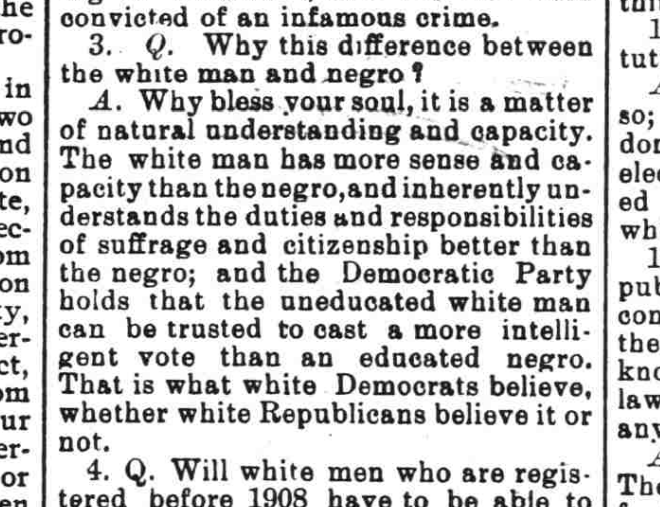
3. Why is the Literacy Clause no longer enforced?
The federal Voting Rights Act of 1965, signed into law by President Lyndon B. Johnson, made it illegal for the states to use literacy tests to prevent people from voting.
“After being used to suppress the black vote for decades, the passage of the Voting Rights Act in 1965 stripped the literacy test of its enforcement power,” wrote political scientist Christopher Cooper of Western Carolina University in the Old North State Politics blog in February. “With the stroke of a pen, LBJ turned the literacy test from an active tool of oppression into an unsightly and garish symbol of racism, albeit one without the force of law.”
4. If the Literacy Clause is racist and unenforceable, why is it still in the state Constitution?
North Carolina voters approved a massive revision to their Constitution in 1970, but several provisions, including the Literacy Clause, had votes separate from the vote to replace the old Constitution with a new one, Cooper wrote.
One of those was whether to repeal the Literacy Clause. The vote was 279,132 (44%) to delete the racist rule, and 355,347 (56%) to keep it. All of the other constitutional amendments in 1970 were approved.
Cooper analyzed the results and found that counties with larger Black populations tended to vote to keep the literacy test.
“This does not mean that black people were voting for the literacy test to remain,“ he said. “Instead, it is more likely that the white vote in the counties with high black populations came out overwhelmingly to support the literacy test.
“These results are broadly supportive of racial threat theory, the idea that whites are more likely to respond negatively and are more likely to support racist policies and candidates when they are surrounded with diverse populations,” Cooper said.
5. That vote was more than 50 years ago. Can the Literacy Clause be repealed now?
In 2013 and 2017, bills to ask North Carolina voters to amend their Constitution to repeal the literacy test requirement passed the state House unanimously. But the bills got no hearings in the Senate.
“The lore has been that NC legislators have long supported getting rid of the literacy test, but were afraid that we might have a repeat of the 1970 vote,” Cooper wrote in his blog post.
This year, a similar piece of legislation to repeal the Literacy Clause, House Bill 44, would put the question to the voters in the November 2024 elections. It has passed a House committee and could be tracking for a floor vote.
If a repeal bill passes the House again, the state Senate appears to be more likely to advance it than in 2013 and 2017, as Republican state Senate leader Phil Berger has expressed support for repealing the Literacy Clause, news outlets have reported.
Then it would be up to the voters — would they support a repeal?
Cooper wrote that conditions for repealing the literacy test are far different today than in 1970.
First, he said, the bill has strong bipartisan support.
Second, Black voter turnout today is higher than in the past and could counter any lingering racial threat fears among white voters.
And third, the 2024 election would take place in a high-turnout presidential year, “one that will more likely mirror the will of the people in North Carolina.”
Voter support is unclear in recent polling:
A survey of 500 voters in late February and early March by the rightwing Carolina Partnership for Reform found that 40% supported repeal and 41% wanted to keep the Literacy Clause. It said this fell in the survey’s margin of error.
The leftwing Carolina Forward organization also polled the question in early March. It said 57% of voters wanted to repeal the Literacy Clause and 27% wanted to keep it.
In May 2021, a survey by the rightwing John Locke Foundation found 38.9% wanted to end the literacy requirement and 46% wanted to keep it.
The phrasing of the survey questions may account for the differing results.
The Locke Foundation and Carolina Partnership polls that showed less support for repealing the Literacy Clause simply asked respondents if the state should repeal the requirement that someone must be able to read and write or must be literate in order to vote.
The Carolina Forward poll that reported majority support for a repeal told the respondents that the Literacy Clause is “a provision from the Jim Crow era” that is “no longer legally enforceable.” Then it asked the respondents whether the clause should be repealed.
Senior North Carolina reporter Paul Woolverton can be reached at 910-261-4710 and pwoolverton@gannett.com.
This article originally appeared on The Fayetteville Observer: NC's constitution has a racist rule—will voters repeal literacy tests?

